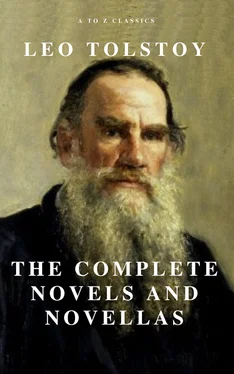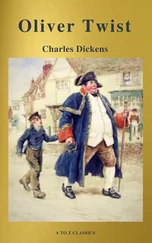Leo Tolstoy - Leo Tolstoy - The Complete Novels and Novellas (Active TOC) (A to Z Classics)
Здесь есть возможность читать онлайн «Leo Tolstoy - Leo Tolstoy - The Complete Novels and Novellas (Active TOC) (A to Z Classics)» — ознакомительный отрывок электронной книги совершенно бесплатно, а после прочтения отрывка купить полную версию. В некоторых случаях можно слушать аудио, скачать через торрент в формате fb2 и присутствует краткое содержание. Жанр: unrecognised, на английском языке. Описание произведения, (предисловие) а так же отзывы посетителей доступны на портале библиотеки ЛибКат.
- Название:Leo Tolstoy: The Complete Novels and Novellas (Active TOC) (A to Z Classics)
- Автор:
- Жанр:
- Год:неизвестен
- ISBN:нет данных
- Рейтинг книги:5 / 5. Голосов: 1
-
Избранное:Добавить в избранное
- Отзывы:
-
Ваша оценка:
- 100
- 1
- 2
- 3
- 4
- 5
Leo Tolstoy: The Complete Novels and Novellas (Active TOC) (A to Z Classics): краткое содержание, описание и аннотация
Предлагаем к чтению аннотацию, описание, краткое содержание или предисловие (зависит от того, что написал сам автор книги «Leo Tolstoy: The Complete Novels and Novellas (Active TOC) (A to Z Classics)»). Если вы не нашли необходимую информацию о книге — напишите в комментариях, мы постараемся отыскать её.
– Childhood
– Boyhood
– Youth
– Family Happiness
– The Cossacks
– War and Peace
– Anna Karenina
– The Death of Ivan Ilyich
– The Kreutzer Sonata
– Resurrection
– The Forged Coupon
– Hadji Murad
Leo Tolstoy: The Complete Novels and Novellas (Active TOC) (A to Z Classics) — читать онлайн ознакомительный отрывок
Ниже представлен текст книги, разбитый по страницам. Система сохранения места последней прочитанной страницы, позволяет с удобством читать онлайн бесплатно книгу «Leo Tolstoy: The Complete Novels and Novellas (Active TOC) (A to Z Classics)», без необходимости каждый раз заново искать на чём Вы остановились. Поставьте закладку, и сможете в любой момент перейти на страницу, на которой закончили чтение.
Интервал:
Закладка:
‘Yes, it seems funny to you,’ said Vanyusha, ‘but just try to talk to these people yourself: they set themselves against one and there’s an end of it. You can’t get as much as a word out of them.’ Vanyusha angrily threw down a pail on the threshold. ‘Somehow they don’t seem like Russians.’
‘You should speak to the Chief of the Village!’
‘But I don’t know where he lives,’ said Vanyusha in an offended tone.
‘Who has upset you so?’ asked Olenin, looking round.
‘The devil only knows. Faugh! There is no real master here. They say he has gone to some kind of kriga, and the old woman is a real devil. God preserve us!’ answered Vanyusha, putting his hands to his head. ‘How we shall live here I don’t know. They are worse than Tartars, I do declare — though they consider themselves Christians! A Tartar is bad enough, but all the same he is more noble. Gone to the kriga indeed! What this kriga they have invented is, I don’t know!’ concluded Vanyusha, and turned aside.
‘It’s not as it is in the serfs’ quarters at home, eh?’ chaffed Olenin without dismounting.
‘Please sir, may I have your horse?’ said Vanyusha, evidently perplexed by this new order of things but resigning himself to his fate.
‘So a Tartar is more noble, eh, Vanyusha?’ repeated Olenin, dismounting and slapping the saddle.
‘Yes, you’re laughing! You think it funny,’ muttered Vanyusha angrily.
‘Come, don’t be angry, Vanyusha,’ replied Olenin, still smiling. ‘Wait a minute, I’ll go and speak to the people of the house; you’ll see I shall arrange everything. You don’t know what a jolly life we shall have here. Only don’t get upset.’
Vanyusha did not answer. Screwing up his eyes he looked contemptuously after his master, and shook his head. Vanyusha regarded Olenin as only his master, and Olenin regarded Vanyusha as only his servant; and they would both have been much surprised if anyone had told them that they were friends, as they really were without knowing it themselves. Vanyusha had been taken into his proprietor’s house when he was only eleven and when Olenin was the same age. When Olenin was fifteen he gave Vanyusha lessons for a time and taught him to read French, of which the latter was inordinately proud; and when in specially good spirits he still let off French words, always laughing stupidly when he did so.
Olenin ran up the steps of the porch and pushed open the door of the hut. Maryanka, wearing nothing but a pink smock, as all Cossack women do in the house, jumped away from the door, frightened, and pressing herself against the wall covered the lower part other face with the broad sleeve of her Tartar smock. Having opened the door wider, Olenin in the semi-darkness of the passage saw the whole tall, shapely figure of the young Cossack girl. With the quick and eager curiosity of youth he involuntarily noticed the firm maidenly form revealed by the fine print smock, and the beautiful black eyes fixed on him with childlike terror and wild curiosity. ‘This is she,’ thought Olenin. ‘But there will be many others like her’ came at once into his head, and he opened the inner door. Old Granny Ulitka, also dressed only in a smock, was stooping with her back turned to him, sweeping the floor.
‘Good-day to you. Mother! I’ve come about my lodgings,’ he began.
The Cossack woman, without unbending, turned her severe but still handsome face towards him.
‘What have you come here for? Want to mock at us, eh? I’ll teach you to mock; may the black plague seize you!’ she shouted, looking askance from under her frowning brow at the new-comer.
Olenin had at first imagined that the way-worn, gallant Caucasian Army (of which he was a member) would be everywhere received joyfully, and especially by the Cossacks, our comrades in the war; and he therefore felt perplexed by this reception. Without losing presence of mind however he tried to explain that he meant to pay for his lodgings, but the old woman would not give him a hearing.
‘What have you come for? Who wants a pest like you, with your scraped face? You just wait a bit; when the master returns he’ll show you your place. I don’t want your dirty money! A likely thing — just as if we had never seen any! You’ll stink the house out with your beastly tobacco and want to put it right with money! Think we’ve never seen a pest! May you be shot in your bowels and your heart!’ shrieked the old woman in a piercing voice, interrupting Olenin.
‘It seems Vanyusha was right!’ thought Olenin. “A Tartar would be nobler”,’ and followed by Granny Ulitka’s abuse he went out of the hut. As he was leaving, Maryanka, still wearing only her pink smock, but with her forehead covered down to her eyes by a white kerchief, suddenly slipped out from the passage past him. Pattering rapidly down the steps with her bare feet she ran from the porch, stopped, and looking round hastily with laughing eyes at the young man, vanished round the corner of the hut.
Her firm youthful step, the untamed look of the eyes glistening from under the white kerchief, and the firm stately build of the young beauty, struck Olenin even more powerfully than before. ‘Yes, it must be she,’ he thought, and troubling his head still less about the lodgings, he kept looking round at Maryanka as he approached Vanyusha.
‘There you see, the girl too is quite savage, just like a wild filly!’ said Vanyusha, who though still busy with the luggage wagon had now cheered up a bit. ‘La fame!’ he added in a loud triumphant voice and burst out laughing.
Chapter 11
Towards evening the master of the house returned from his fishing, and having learnt that the cadet would pay for the lodging, pacified the old woman and satisfied Vanyusha’s demands.
Everything was arranged in the new quarters. Their hosts moved into the winter hut and let their summer hut to the cadet for three rubles a month. Olenin had something to eat and went to sleep. Towards evening he woke up, washed and made himself tidy, dined, and having lit a cigarette sat down by the window that looked onto the street. It was cooler. The slanting shadow of the hut with its ornamental gables fell across the dusty road and even bent upwards at the base of the wall of the house opposite. The steep reed-thatched roof of that house shone in the rays of the setting sun. The air grew fresher. Everything was peaceful in the village. The soldiers had settled down and become quiet. The herds had not yet been driven home and the people had not returned from their work.
Olenin’s lodging was situated almost at the end of the village. At rare intervals, from somewhere far beyond the Terek in those parts whence Olenin had just come (the Chechen or the Kumytsk plain), came muffled sounds of firing. Olenin was feeling very well contented after three months of bivouac life. His newly washed face was fresh and his powerful body clean (an unaccustomed sensation after the campaign) and in all his rested limbs he was conscious of a feeling of tranquillity and strength. His mind, too, felt fresh and clear. He thought of the campaign and of past dangers. He remembered that he had faced them no worse than other men, and that he was accepted as a comrade among valiant Caucasians. His Moscow recollections were left behind Heaven knows how far! The old life was wiped out and a quite new life had begun in which there were as yet no mistakes. Here as a new man among new men he could gain a new and good reputation. He was conscious of a youthful and unreasoning joy of life. Looking now out of the window at the boys spinning their tops in the shadow of the house, now round his neat new lodging, he thought how pleasantly he would settle down to this new Cossack village life. Now and then he glanced at the mountains and the blue sky, and an appreciation of the solemn grandeur of nature mingled with his reminiscences and dreams. His new life had begun, not as he imagined it would when he left Moscow, but unexpectedly well. ‘The mountains, the mountains, the mountains!’ they permeated all his thoughts and feelings.
Читать дальшеИнтервал:
Закладка:
Похожие книги на «Leo Tolstoy: The Complete Novels and Novellas (Active TOC) (A to Z Classics)»
Представляем Вашему вниманию похожие книги на «Leo Tolstoy: The Complete Novels and Novellas (Active TOC) (A to Z Classics)» списком для выбора. Мы отобрали схожую по названию и смыслу литературу в надежде предоставить читателям больше вариантов отыскать новые, интересные, ещё непрочитанные произведения.
Обсуждение, отзывы о книге «Leo Tolstoy: The Complete Novels and Novellas (Active TOC) (A to Z Classics)» и просто собственные мнения читателей. Оставьте ваши комментарии, напишите, что Вы думаете о произведении, его смысле или главных героях. Укажите что конкретно понравилось, а что нет, и почему Вы так считаете.












